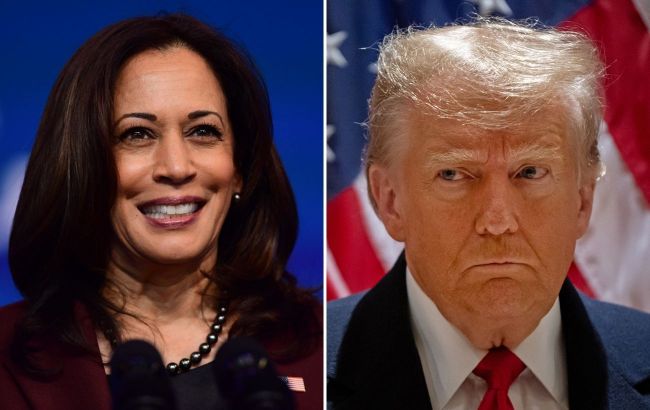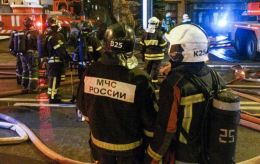Hurricanes, hostages and dirt: How 'October surprises' determine US election fate
 Kamala Harris and Donald Trump (collage: RBC-Ukraine)
Kamala Harris and Donald Trump (collage: RBC-Ukraine)
Hurricanes were raging in the United States, causing President Joe Biden to postpone his trip to Ramstein. And Donald Trump is actively using the natural disaster in his election campaign.
RBC-Ukraine explains how various "black swans” in the last month before the US presidential election determine its outcome.
Contents
Hurricanes as October surprise in 2024
In early October, several hurricanes devastated the southeastern United States. This is a common natural disaster in the United States, but this year's hurricanes are taking place against the backdrop of a fierce presidential campaign. In particular, because of Hurricane Milton, current US President Joe Biden canceled an important visit to Ramstein, Germany. The hurricane factor is also taken into account by the candidates - US Vice President Kamala Harris and Donald Trump. After all, the way the authorities deal with the consequences of the weather can affect voter sentiment. In particular, we are talking about the fragile states of Georgia and North Carolina, which were affected by hurricanes.
“The topic of Hurricane Milton is in the first place in all American media. A few weeks before the election, this is an extraordinary challenge for the current administration, as any assistance and action provided will always be insufficient. Thus, this is a great field for criticism from the opposition,” Maksym Skrypchenko, President of the Center for Transatlantic Dialogue, told RBC-Ukraine.
There is a special term in the US for events that suddenly occur at the end of an election campaign - 'October surprises'.
Other 'October surprises
This concept became popular during the 1980 presidential election.
A year earlier, an Islamic revolution had taken place in Iran, during which the new government seized the American embassy and took US citizens hostage.
Throughout the year, then-President Jimmy Carter hoped to secure the release of the hostages in time for the election, but this did not happen. His failure was one of the reasons why he lost in the polls to Ronald Reagan. In the end, the hostages were released a few hours after the inauguration of the new US President Ronald Reagan. Later, there was even speculation that the Reagan team had colluded with Iran to hold the hostages until after the election.
In the 2008 elections, Republican John McCain and Democrat Barack Obama were running for president. The surprise in the form of an economic crisis that year came a little sooner - in September.
The Dow Jones stock index fell by 18% in the first week of October. One of the largest US banks, Lehman Brothers, went bankrupt, and the authorities rescued several others with great difficulty. Unemployment rose sharply in early October.
Before that, McCain's fellow party member, George W. Bush, had served two terms in the White House. So the Republican was influenced by the failures of his predecessors. Barack Obama became the new president of the United States.
During the 2016 campaign, when Donald Trump and Hillary Clinton were competing for the presidency, there were several October surprises.
First, a video from 2005 appeared in which Donald Trump spoke disparagingly of women. Immediately following this release, about a dozen American women came forward, claiming that the politician had harassed or assaulted them at various times. He categorically denied all these accusations.
Subsequently, Clinton's reputation was also damaged. The WikiLeaks website launched a two-month campaign to release her emails. As Secretary of State, she used a private e-mail for official correspondence. Importantly, in late October, the US Attorney General initiated an investigation against Clinton. On the eve of the scandal, Clinton was leading in the polls but eventually lost the election to Trump.
Effect is not always obvious
There are examples when, despite the negative effect of October surprises, candidates managed to minimize the damage from them.
In 2000, Republican George W. Bush was almost on equal footing with Democrat Al Gore. But five days before the election, news broke that Bush had been arrested for drunken driving in 1976. His team immediately claimed that Gore's campaign had specifically obtained this fact as a billet to do maximum damage.
Gore's staff said that nothing had been prepared on purpose, and later no one could prove the Democrats' involvement. However, Bush did not deny that he had a problem with alcohol addiction, so such sincerity did not scare off voters. The election ended in a near-tie, but the Republicans managed to win by a very small margin.
During the 1936 campaign, the black vote was key. On October 28, a high-profile incident occurred that threatened the incumbent US President Franklin Delano Roosevelt.
During an event in New York, one of his employees, Stephen Earley, was detained by two police officers. In an outburst of emotion, he kneed one of the police officers in the groin. Officer James Sloan turned out to be black. It also turned out that Earley was a descendant of a Confederate general during the US Civil War. The Confederacy advocated the preservation of slavery for blacks, so the situation became symbolic.
Two days before the election, Roosevelt tried to save the situation by announcing the creation of the Tuskegee Airmen, a black aviation unit, and for the first time in US history, he promoted a black man to the rank of brigadier general. As a result, Roosevelt became president for the third time, losing only a small percentage of the African American vote.
Sources: Reuters, CNN, Fox News, history.com, and comments of Maksym Skrypchenko, President of the Center for Transatlantic Dialogue.
RBC-Ukraine wrote about the balance between the two key candidates in the US election as of early October, a month before the election day.

